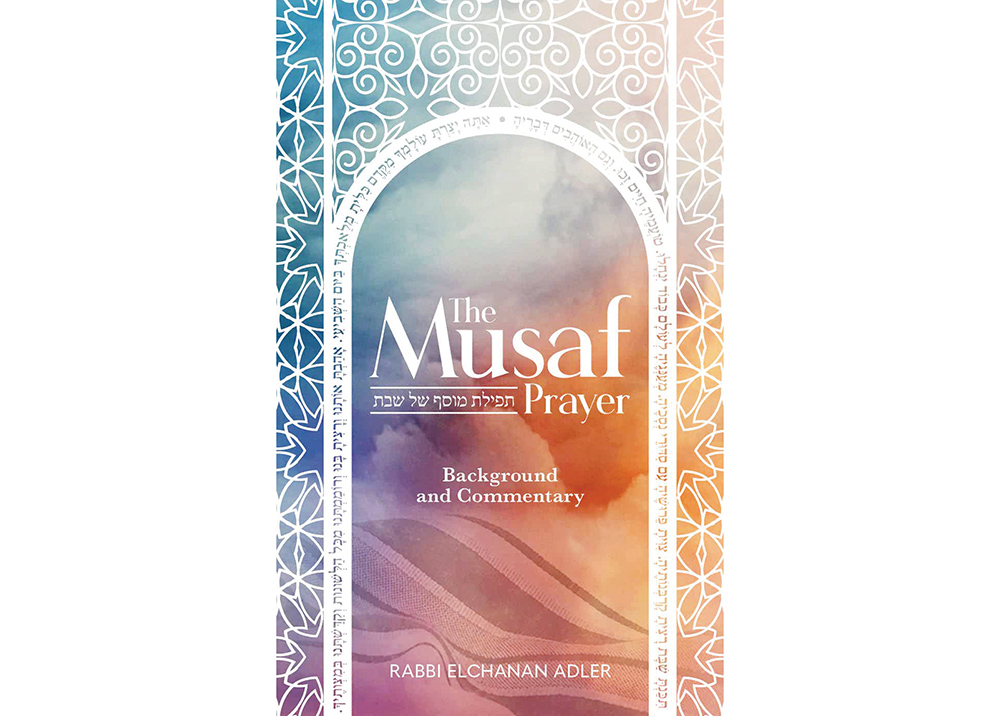
Reviewing: “The Musaf Prayer: Background and Commentary” by Rabbi Elchanan Adler. Mosaica Press. 2023. English. Hardcover. 230 pages. ISBN-13: 978-1957579412.
It’s time to daven Musaf on Shabbos morning. The rabbi’s drasha has inspired us to daven with feeling and emotion, and because Musaf is when the shul is most full, we can feel a certain spiritual energy in the room. However, there is a roadblock. Despite the fact that the siddur is the most widely used Jewish book, it is also the least understood and least appreciated. The prayer book is a multilayered, complex composite of poetry and prose, replete with biblical and Talmudic allusions. How do we translate our inspiration and motivation into a meaningful davening, when we have only a very vague idea and limited appreciation for the meaning of the words we are about to say?
Fortunately, Rabbi Elchanan Adler, rosh yeshiva at Yeshiva University and holder of the Eva, Morris and Jack K. Rubin Memorial Chair in Rabbinics, has placed into our hands a solution to this problem with his recently published “The Musaf Prayer: Background and Commentary.” An English translation of his 2016 Hebrew work, “The Musaf Prayer” is written in a clear, concise and easily readable style. It approaches the davening from multiple angles including historical discussion, halachic debate and literary analysis. However, Rabbi Adler never loses sight of the central goal of the book, which is to foster an inspired and enhanced davening experience. Therefore, mussar (ethics) and hashkafa (perspective) pervade and inform even the more scholarly discussions.
Two examples should suffice to illustrate the practical value of this volume. The meaning of the opening phrase of the central blessing of Musaf, “tikanta Shabbos,” is unclear. Rabbi Adler cites the commentary of Rabbeinu Shlomo bar Shimshon of Worms who explains that tikanta is related to the word hachana, preparation. The meaning of the phrase is: “You prepared all of the Shabbos needs and then Shabbos itself.” Rabbi Adler relates Rabbeinu Shlomo’s comment to the idea, famously expressed in Lecha Dodi, that Shabbos is “sof ma’aseh be-machshavah techilah, the final action, but the initial thought.” In other words, explains Rabbi Adler, “Shabbos was the purpose and ultimate goal of the Creation; as such, it is considered as though Shabbos was prepared in advance for Hashem to rest on it, and all the other days of Creation are merely incidental to Shabbos.” The very essence of Shabbos as the centerpiece of Creation is alluded to in the one word tikanta.
A different example is Rabbi Adler’s halachic discussion of whether there is an obligation to be happy on Shabbos. On the one hand, the text of Musaf states, “yismechu be-malchusecha Shomrei Shabbos, they who keep the Shabbos shall rejoice in Your kingdom.” On the other hand, while the Torah states with regard to Yom Tov “ve-samachta be-chagecha, And you shall rejoice on your holiday,” there does not seem to be an overt scriptural source for a mitzvah of simcha, joy, on Shabbos. Rabbi Adler reviews the evidence for a requirement to rejoice on Shabbos and concludes that there may be an obligation to be happy on Shabbos, but it is not identical to the mitzvah of simcha found on Yom Tov: “It seems that on Shabbos, the simcha required is inner joy, which derives automatically from the special light of Shabbos. On Shabbos, there is no obligation to perform certain acts that engender joy as there is on Yom Tov.”
Even more unfamiliar to most of us is the special text of Musaf when Rosh Chodesh falls on Shabbos, known as “Atah Yatzarta.” Rabbi Adler dedicates a significant portion of this volume to the analysis of the meaning and message of this text, as well as some key halakhic issues that pertain to Shabbos Rosh Chodesh. This section, plus a fascinating appendix dealing with the actual sacrifice of the korban musaf, the musaf sacrifice, in the Beis Hamikdash, make this book a worthy addition to every Jewish home.
The rabbis of the Talmud, who composed the Musaf prayer, chose each word with great care, and it is our great loss if we do not appreciate the beauty and depth of their literary and spiritual creation. Whether we peruse this volume Friday night after the meal or bring it along to shul as a prayer companion, “The Musaf Prayer” will serve a critical role in helping us to delve into the ideas and allusions that are contained in the siddur. By unpacking the meaning of every word and phrase, Rabbi Adler reveals important religious concepts that enhance the prayer experience and in turn, enhance the observance of Shabbos itself.
Rabbi Moshe Schapiro is a librarian at the Mendel Gottesman Library of Yeshiva University.









